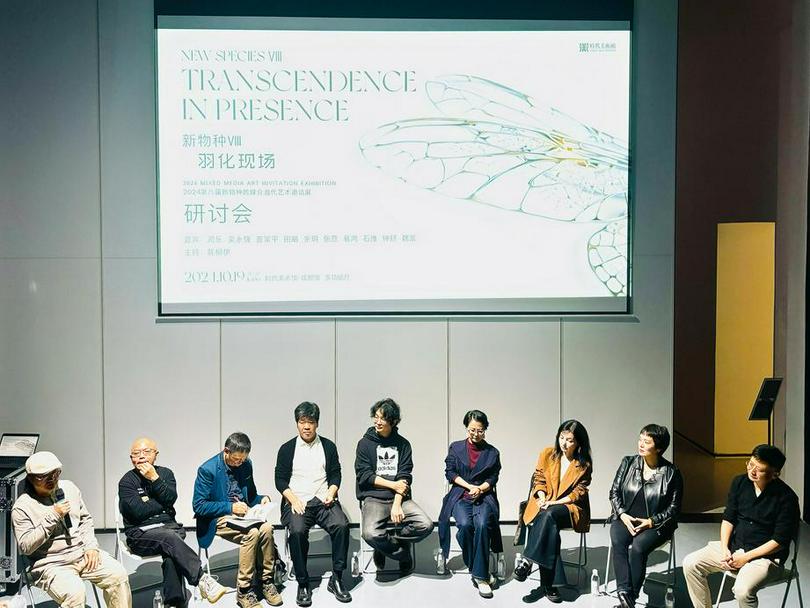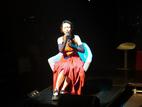The “New Species VIII: Transcendence in Presence” – 2024 Mixed Media Art Invitation Exhibition held its opening ceremony and symposium at the Times Art Museum – Chengdu Section on October 19, 2024.
Nine guest speakers from diverse fields—including art, literature, media, philosophy, and religion—exchanged views on the art exhibition and discuessed whether the development of technology would lead to the formation of a “new species.”
Among them, Professor Zha Changping, an art critic and biblical scholar, currently works at the Christian Research Center of Institute for Studies of Taoism and Religious Culture in Sichuan University. His academic focus includes art criticism, biblical studies, and worldview logical theory. He has published over 200 academic papers and several monographs.
In the first round of discussions on the "New Species" exhibition as a phenomenon-level event, Zha said, "I very much agree...that Chinese contemporary art is a 'surface layer.' Not only contemporary art, but contemporary Chinese society as a whole is also a 'surface layer' within the context of traditional Chinese thought."
Zha summarized works exhibited into three categories. The first includes works aiming to embed Chinese contemporary art, the “surface layer,” into history, focusing on the history of civilization. The second category features works created from the perspective of social history. For instance, the “Facial Make-up” series portrays the medium as a symbolic communication between people, illustrating how individuals living in metaphorical “caves” are opened up by the aid of the medium, and thus are provided a pathway from the self to others. The third category encompasses works on the level of personal growth history, reflecting individual histories and showcasing personal growth.
He said, “The development of art is definitely related to our personal growth. However, I suggest we avoid relying solely on images when creating artwork. Let’s reflect on the purpose of each image we use. I hope contemporary art can delve into this sense of self-historical awareness, social-historical awareness, and spatial-historical awareness.”
“Contemporary art must take root in an awareness of history; otherwise, it will be rootless,” continued Professor Zha. To explain the need for a deep understanding of cultural history, he exemplified a work that dynamically illustrates the creation process of Leonardo da Vinci. To create this work, the artist needs to learn the similarities and differences between da Vinci’s culture centuries ago and ours, the homogeneity worth inheriting, and the heterogeneity that needs to be discarded.
In the second round of the symposium, on “whether the rise of technology will become a new species”, Zha stated bluntly, “Technology is definitely not a new species. If technology becomes a new species, it will lead to fatal problems.”
He mentioned a study conducted among children aged 12 to 16 by a scholar, which found that children who played with their phones for four hours a day had significantly different intellectual levels after four years compared to those who played for only 40 minutes a day.
“People who play with their phones for four hours a day are likely to be ruled by those who only play for 40 minutes. We are indeed controlled by technology today. We spend most of our time on our phones, consuming valueless ‘junk information,’ which is actually a process of enslaving ourselves.”
Zha further discussed why technology has dominated us and become part of our lives. It is because our subjective power of negation has been suppressed. In other words, if a person’s life is not rooted in the history of their own growth, real life, and human civilization, their roots are too shallow to resist the overwhelming control of technology over humanity.
“We must move in the opposite direction of the so-called ‘trendy’, and art is precisely the force for this,” Zha said. When everyone is celebrating, art should refuse to go with them. If art follows, it is called “the art of following the crowd.” In history, such arts were many but were subsequently eliminated.
“Technology is not a ‘new species’; it is always only a parasite, and the key lies in our attitude,” Zha said. If people turn themselves into parasites, technology will control them. If people view technology as a parasite, they can subjectively control it. He advised people to reduce daily smartphone use, especially for valueless junk information, so that they can become the subject and master of their own lives.
- Translated by Charlie Li












